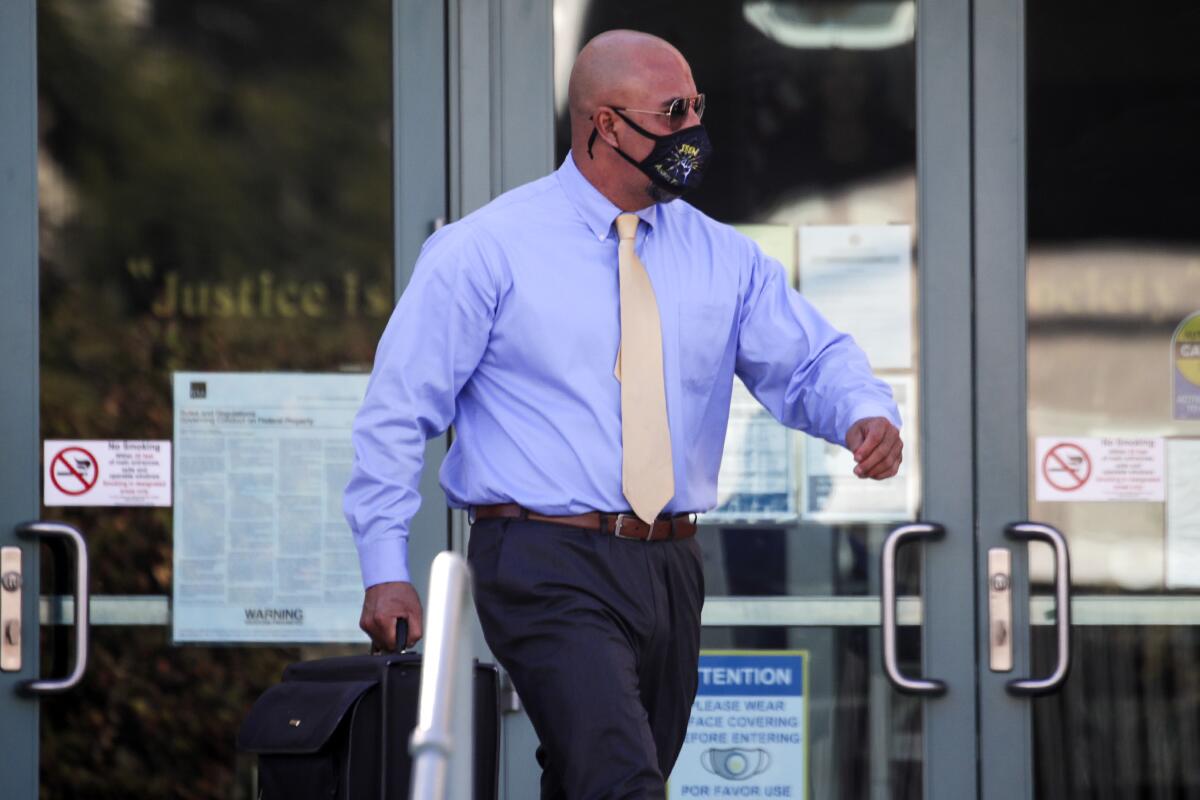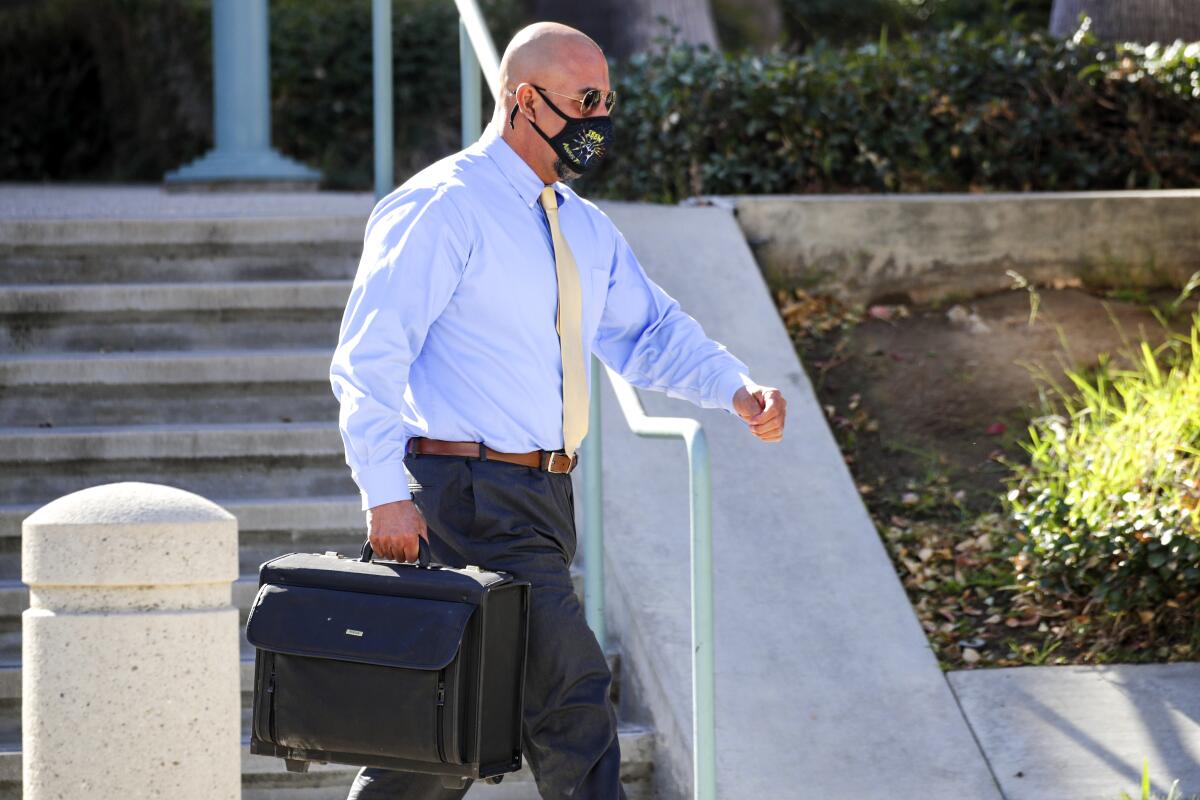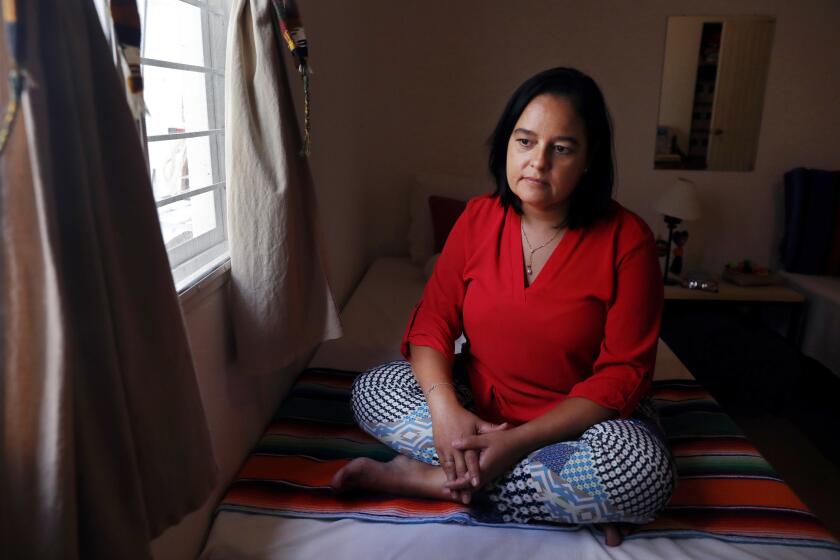How a woman who was assaulted by a federal agent sought justice against her abuser

- Share via
John Olivas’ explosive temper frightened his girlfriend.
In fits of rage, the federal agent would slam her into a wall and choke her, she recently testified. The madness reached new heights one night in September 2012 when she drove him home from a Riverside bar where he had been drinking heavily, she said.
Olivas, sitting in the passenger’s seat, put the tip of his handgun into his mouth and asked what she would do if he pulled the trigger, she said. She begged him to put it down. He waved the gun around “like it was a joke,” then set it on his leg.
On the ride home, he got angry. He pointed the gun at her head and asked again what she’d do if he fired it.
“I was freaking out,” she told the jury.
Once home, she said, Olivas knocked her down, dragged her across the carpet and raped her.
“I was crying, telling him to stop,” she testified. “He kept going.”
The 34-year-old woman, whom The Times is identifying by her first initial, N., was the central witness last month in a federal trial of Olivas, a onetime agent with the Department of Homeland Security. The Times generally does not publish the names of people who say they were sexually assaulted.
The trial was a rare federal prosecution of a domestic violence case under a civil rights law that is typically applied to cops or prison guards who beat, shoot or sexually assault suspects or detainees.
Olivas faced charges that he not only sexually assaulted N. and a previous girlfriend, but abused his position as a federal agent to keep both women silent.
Prosecutors allege that Olivas, 47, convinced the women that he would use his influence as a law enforcement officer to make sure any complaints to police were ignored.
After two days of deliberations at a courthouse in Riverside, the jury deadlocked on Dec. 15, and U.S. District Judge Jesus G. Bernal declared a mistrial. Prosecutors plan to retry Olivas, who denies sexually assaulting the women.
“This is an overreach of the federal government against Mr. Olivas,” his lawyer, Meghan Blanco, told the jury. “The two accusers in this case are not credible.”
Olivas has already been imprisoned for abusive behavior. He served 21 months after pleading guilty in 2015 to state charges that he assaulted his father with a gun and injured N. when he tried to block her from fleeing his house.
The federal prosecution of Olivas has raised disturbing questions for the Homeland Security Department and the units of Immigration and Customs Enforcement where he worked.
‘I was crying, telling him to stop. He kept going.’
— N., former girlfriend of John Olivas
Above all, why did it hire Olivas as an armed federal agent in 2007, more than two years after an ex-wife had filed public court records accusing him of assaulting her?
Before hiring Olivas, ICE did a full background check and evaluated him under a “whole-person concept,” the agency told The Times in a statement. It did not directly answer questions on the alleged spousal abuse.
The ex-wife’s court filings include her handwritten accounts of harrowing scenes of violence and screaming threats by Olivas, including some she reported to Riverside police in 2005.
She used the same word that N. would use on the witness stand 16 years later to describe how she felt while under attack by the bald 6-foot-4 bodybuilder: terrified.
::
After a quick flirtation on Facebook in March 2012, N. and Olivas met for dinner at a BJ’s in Arcadia. Then 24 years old, N. was impressed that Olivas was a federal agent. She’d studied criminal justice in college and aspired to be a police officer. That first night, Olivas showed her his badge, gun and SWAT gear.
“I thought it was really cool,” N. testified.
Less than a week later, she moved into his house in Riverside. What quickly developed was a cycle of volcanic tantrums and violence, followed by profuse apologies from Olivas, sometimes with bouquets of flowers. It went on for nine months.
Olivas, who weighed 260 pounds, was a foot taller than N. She weighed 110. The first time he grabbed her arm and shoved her into a wall, she was stunned, she said.
“I couldn’t believe what happened,” she testified, recalling her bruised shoulder.
On other occasions, Olivas banged N.’s legs with a remote control, she testified. Prosecutors showed the jury a photo of her legs covered with bruises.
Anticipating that jurors would wonder why N. stayed with Olivas, prosecutors hired a psychologist who specializes in trauma. She told the jury that domestic violence victims sometimes remain in abusive relationships because of low self-esteem or a bond that persists despite the violence.
N. said she had blamed the beatings on herself, thought she could fix their relationship by behaving better, and was in denial about how bad it was.
When she did threaten to call police, she said, “He made me believe they wouldn’t do anything,” telling her “he’d crack a beer with them” if they showed up.
She once used her phone to record Olivas saying that if she cheated on him, he would send one of his “snitch” informants to beat her up. (Olivas was then working gang and drug cases at Homeland Security Investigations.)
Olivas closely monitored her phone to ensure she was not speaking with other men. He erupted one night when some guys playing pool hit on her at the Brandin’ Iron dance club in San Bernardino, she recalled. “He started screaming at me in front of the whole entire bar,” she said.
Olivas walked to the door, she testified, “snapped his fingers and pointed to the ground and said ‘now’ like I was a dog.”
She came as called.
At Killarney’s, his favorite Riverside bar, Olivas was friendly with the bouncers, but would show them his badge when he wanted to cut the line to get in, then stash his government-issued pistol in a niche where kitchen supplies were stored, she said.
The night N. alleges Olivas first raped her, his drinking at Killarney’s made him “absolutely belligerent,” she said. When they got into his pickup truck and he put the gun in his mouth, she was convinced it was loaded, she said.
Later, as she fumbled with her keys at the front door to his house, he held the government-issued gun to her back, she testified. “I was shaking.”
Inside, she said, he pushed her to the ground, pulled her across the rug so hard that her elbow started bleeding, yanked her pants off, and told her, “Don’t you dare bleed on my carpet.”
Olivas used one hand to pin her wrists above her head and the other to choke her while he called her vulgar names, N. said.
“Why didn’t you call the police?” Assistant U.S. Atty. Frances Lewis asked.
“I didn’t think they would do anything,” N. responded.
Because he was a federal agent? Yes, she answered.

The violence was relentless. Days after the alleged rape, Olivas’ elderly parents, who lived down the street, walked in on a heated argument. His mother opened the front door and saw him at the top of the stairs threatening to hurl N.’s new computer over the banister. She ordered him to put it down.
Olivas put the computer on the bed in his bedroom and picked up his gun off the dresser. He pointed it at N. His mother screamed.
“Get out of the f—ing house,” he yelled to his mom.
By the time his father arrived, Olivas was pointing the gun at his mother, N. testified. She stepped so close that the muzzle was inches from her forehead.
“Go ahead, Johnny,” she told her son. “I dare you.”
N. started screaming. His father grabbed the gun and the men fell to the ground, wrestling over the weapon. “It’s not loaded!” Olivas bellowed.
Years later, Olivas would admit the assault on his dad was a felony. But for months no one called the police.
Lewis asked N. if she would have called the cops if Olivas had not been a federal agent.
“Absolutely.”
::
One question his recent trial could not answer was how Olivas got hired as a federal agent; even a cursory check of state Superior Court records would have uncovered allegations of domestic abuse in his ex-wife’s two applications for restraining orders.
His ex-wife was six months pregnant when she asked Olivas to move out of their Riverside apartment in August 2004. He left, but kept a key.
Olivas then let himself in several times while she was showering or sleeping and abused her, her reports say. He ripped a towel rack off the wall, forced her to walk on shards of glass from a picture frame he smashed, and broke a cordless phone in half “with his bare hands” to stop her from calling police, she wrote.
The California Medical Board has reinstated a number of doctors who sexually abused patients, a Times investigation found.
In one late-night phone call, Olivas, who sounded drunk, threatened to snatch the couple’s baby out of daycare and take him away, his ex-wife said. Afterward, she filed a police report and sought the first temporary restraining order.
In May 2005, a Superior Court judge found that Olivas had a history of domestic violence and granted the order. It required him to stay 100 yards from his ex-wife and the baby. It also compelled him to sell any guns in his possession or turn them over to police.
Olivas’ ex-wife got another temporary restraining order in December 2007 following a Christmas Day family visit during which he’d threatened to “kill anyone I dated,” she wrote in the application.
By then Olivas was a newly hired officer at the Homeland Security Department. In May 2008, the department issued Olivas his .40-caliber Sig Sauer semiautomatic pistol. Possessing the gun violated the restraining order, which was still in effect, though it expired a few months later.
ICE spokeswoman Paige Hughes declined to discuss why Olivas was issued the gun despite the order. In general, she said, employees are required to “self-report” domestic-violence protection orders to supervisors.
Hughes also would not answer directly whether Homeland Security tolerates domestic violence among its armed agents, saying that they “are held to the highest standard of professional and ethical conduct.”
Although Olivas was never charged with a crime involving his ex-wife, prosecutors called her to testify at the federal trial.
The ex-wife burst into tears as she told jurors what happened after Olivas let himself into the apartment while she was showering one afternoon in 2004. He insisted they get back together. She refused. An argument ensued.
He grabbed her and held her arms straight by her side, she said. He pulled her to the floor and forced himself inside her, she told the jury, and ignored her tearful pleas to stop.
“I want you, you’re mine, you’re my wife,” she remembered him saying with seething anger.
::
N. had one more story from her final days with Olivas.
One afternoon in 2012, she told him she wanted to leave the house. He tried to stop her, this time by squeezing her in a tight bear hug, her elbows pressed into her ribs.
She told him to let her go. “It started to really hurt,” she testified.
She heard a pop in her ribs, and suddenly her left side hurt so severely she thought she was going to throw up. She could not inhale enough air to talk.
Extreme pain persisted for days. She wanted to go to the hospital, but Olivas parked his car behind hers for three days so she couldn’t leave, she later told police.
“I don’t want people to think I beat you or something,” Olivas told her by text. “All I did was hug you.”
“You knew you couldn’t squeeze me that hard,” she replied. “You did it so I wouldn’t leave.”
She insisted on seeing a doctor. Olivas texted that he was worried a doctor would be suspicious about bruises he’d left on her legs during sex.
“I’ll be in pants. Don’t worry,” she replied.
“Babe, you don’t understand, domestic violence is a big deal,” he texted.
‘I don’t want people to think I beat you or something. All I did was hug you.’
— John Olivas
N. wound up visiting urgent care twice. Doctors could not tell whether a bone was broken. They gave her an elastic brace to wear around her ribs. Nobody notified police.
During her recovery, N. told the jury, Olivas raped her a second time. She said she had agreed to try to have sex, but once they started, “it was excruciating, and I told him that we needed to stop.” He refused, saying “nobody tells him no,” she testified.
As he was raping her, she said, she spotted his Homeland Security gun on the dresser.
“I wanted to just shoot him,” she would later tell the FBI.
Weeks later, she decided to break up and moved out of his house.
“I just woke up and I had enough,” she told the jury.
In a text exchange a few months later, she reminded Olivas of the night in the pickup truck. Olivas denied that he put the gun in his mouth or pointed it at her.
“Delete that comment from your thread,” he told her.
“I swear to God, you put that barrel in your mouth.”
“Stop,” he wrote. “I gotta go. Delete those texts please.”
She saved the texts, took screenshots, and on Oct. 31, 2013, contacted Riverside police.
‘I just wanted to shoot him.’
— John Olivas’ girlfriend
Three weeks later, Claude Arnold, the special agent in charge of Homeland Security Investigations’ Los Angeles field office, told Olivas that his authority to carry a gun was suspended. Another agent took his pistol, badge and credentials later that day.
Two years after that, Olivas pleaded guilty to state charges that he assaulted his father with the gun and injured N. by popping her rib cage.
He served 21 months of a four-year sentence. In 2018, a year after his release from a remote desert prison, FBI agents arrested him before dawn one day on the civil rights charges.
Notes that the jury in the federal trial sent to the judge during deliberations showed they were wrestling with prosecutors’ novel legal argument that Olivas abused his power as a federal agent in the alleged sexual assaults on N. and his previous girlfriend. One of the jury notes asked what it meant for Olivas to “act in his official capacity.”
Prosecutors say N. is eager for the Olivas case to end; the retrial will start in September. But during her testimony last month, it seemed that she had already found at least some relief just from reporting him to the police.
“As you sit here today, are you still afraid of the defendant?” Lewis, one of the prosecutors, asked her.
N. looked up and paused. She smiled slightly and responded, “No.”
More to Read
Sign up for Essential California
The most important California stories and recommendations in your inbox every morning.
You may occasionally receive promotional content from the Los Angeles Times.










